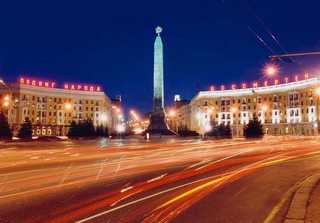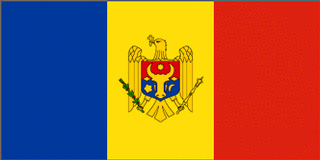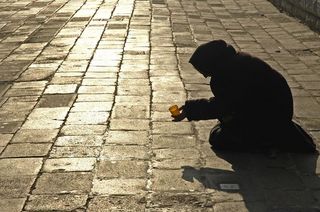Touted by the East German leadership as a barrier against "fascist provocation," the Wall was really an attempt to stop waves of skilled workers and educated people leaving a repressive state
Published:
10 November 2004 y., Wednesday
Touted by the East German leadership as a barrier against "fascist provocation," the Wall was really an attempt to stop waves of skilled workers and educated people leaving a repressive state. Around 3 million fled between 1945 and 1961, when the Wall went up. In time, it became etched in the Western consciousness as a symbol of inhumanity. More than 100 people were picked off by border guards while trying to escape; dozens of others were killed by mines.
However, by November 9, 1989, deep political shifts had prepared the ground for an earthquake. Leader Erich Honecker had been forced to resign and 4 million people had demonstrated for democracy. On that momentous day, the government's spokesman Guenther Schabowski announced that East Germans could go to West Germany if they applied for a visa.
Within minutes, people swarmed around the wall's border posts in what amounted to a siege. At midnight, they broke through to West Germany. That sounded the death knell for the Cold War and set the stage for German reunification a little more than a year later. But 15 years on, a very different kind of mass mobilisation took place. The demonstrations in Leipzig this August highlighted the economic plight of the former East German regions, where unemployment is double that of the western part.
When the old regime collapsed, many skilled workers found themselves on the wrong side of supply-and-demand economics.
Šaltinis:
euronews.net
Copying, publishing, announcing any information from the News.lt portal without written permission of News.lt editorial office is prohibited.
The most popular articles
 The fate of blue fin tuna hangs in the balance this week as a complete ban on the trade is debated by MEPs.
more »
The fate of blue fin tuna hangs in the balance this week as a complete ban on the trade is debated by MEPs.
more »
 A $100 million pledge from the Government of Japan has helped to secure the funding base and launch the operational phase of two new climate programs supporting forest management and renewable energy investments in developing countries.
more »
A $100 million pledge from the Government of Japan has helped to secure the funding base and launch the operational phase of two new climate programs supporting forest management and renewable energy investments in developing countries.
more »
 Europeans quite happy with their personal situation, but less satisfied with economic and social climate in their country.
more »
Europeans quite happy with their personal situation, but less satisfied with economic and social climate in their country.
more »
 Spain wishes to “make as much progress as possible” to ensure the EU becomes party to the Council of Europe's Convention for the Protection of Human Rights and Fundamental Freedoms soon, according to the Spanish Minister for Justice, Francisco Caamaño, at today's opening of a seminar on the challenges and possibilities arising from the Treaty of Lisbon coming into force.
more »
Spain wishes to “make as much progress as possible” to ensure the EU becomes party to the Council of Europe's Convention for the Protection of Human Rights and Fundamental Freedoms soon, according to the Spanish Minister for Justice, Francisco Caamaño, at today's opening of a seminar on the challenges and possibilities arising from the Treaty of Lisbon coming into force.
more »
 According to Belarusian tradition, a stork brings good fortune to the village it settles in while in western culture the stork is commonly associated with childbirth.
more »
According to Belarusian tradition, a stork brings good fortune to the village it settles in while in western culture the stork is commonly associated with childbirth.
more »
 The World Bank Board of Directors today approved an additional financing credit to the Republic of Moldova in the amount of US $20 million for the Social Investment Fund II Project.
more »
The World Bank Board of Directors today approved an additional financing credit to the Republic of Moldova in the amount of US $20 million for the Social Investment Fund II Project.
more »
 The Spanish Health and Social Policy Minister, Trinidad Jiménez, and the European Commissioner for Employment, Social Affairs and Equal Opportunities, Vladimir Spidla, addressed the press in Madrid on the launch of the European Year for Combating Poverty and Social Exclusion 2010.
more »
The Spanish Health and Social Policy Minister, Trinidad Jiménez, and the European Commissioner for Employment, Social Affairs and Equal Opportunities, Vladimir Spidla, addressed the press in Madrid on the launch of the European Year for Combating Poverty and Social Exclusion 2010.
more »
 The European Commission and the Spanish Presidency of the EU will tomorrow launch the 2010 European Year for Combating Poverty and Social Exclusion.
more »
The European Commission and the Spanish Presidency of the EU will tomorrow launch the 2010 European Year for Combating Poverty and Social Exclusion.
more »
 Smoking at a restaurant like this one in Spain could soon be a thing of the past. Spanish lawmakers want to stub out the habit in public places like bars and restaurants. But it's an unpopular proposal in a country where around 30 percent of the population smoke.
more »
Smoking at a restaurant like this one in Spain could soon be a thing of the past. Spanish lawmakers want to stub out the habit in public places like bars and restaurants. But it's an unpopular proposal in a country where around 30 percent of the population smoke.
more »
 As President of the European Economic and Social Committee, I would like, on behalf of all the Committee's members, to express my sympathy to the victims of the earthquake in Haiti.
more »
As President of the European Economic and Social Committee, I would like, on behalf of all the Committee's members, to express my sympathy to the victims of the earthquake in Haiti.
more »